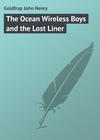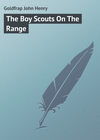Buch lesen: «The Ocean Wireless Boys and the Lost Liner», Seite 8
CHAPTER XXX – IN SEARCH FOR A CLEW
The statement of De Garros concerning his chum struck Sam like a blow between the eyes. Of course he did not place the slightest belief in the Frenchman’s words, but he was sorely puzzled and perplexed.
“Where was this place?” he demanded.
“If you will come with me, I will show you,” said De Garros, linking the boy’s arm in his own. “How sorry I am that I did not accompany him myself! But I thought, I sincerely thought, that he was in good hands.”
“Who was this fellow that was with him,” demanded Sam.
“I don’t know. I didn’t notice particularly. It was no one I had ever seen before.”
“What did he look like?”
“As I told you, I did not pay him the attention that I should had I known things were going to turn out like this. He wore a big sun helmet, if that will afford you any clew.”
They were walking through the streets now toward the hut of Mother Jenny.
Sam suddenly stopped short and struck his forehead with his hand, as if striving to recollect something. Then he shouted:
“Why, why, it was a young man with a sun helmet who was talking to Jarrold at the hotel this morning.”
“So?” exclaimed the Frenchman. “Can this be more of that rascal’s villainy? Has he got a finger in this?”
“I wouldn’t put it past him,” declared Sam vehemently. “He hates Jack, and with good cause from his point of view, for Jack checkmated several of his schemes.”
“In Paris and again here, Jarrold,” muttered De Garros to himself, as if recalling some latent memory. “Some day, my friend, you will meet your reckoning.”
“You knew Jarrold abroad?” asked Sam.
“I knew him, yes. I was his victim, almost – but let us talk no more of this. Let us hurry to the place where I last saw Jack Ready.”
When they reached the hut with its palm thatch and untidy garden, Sam gave a gesture of disgust.
“And this is the place you saw Jack being helped out of?” he asked.
“It is, my friend.”
“I cannot think that he would ever have come to such a hovel of his own free will.”
“Possibly not. But you are confronted with the fact that he was here.”
“That is true. Let us ask that old hag in the doorway what she knows.”
They approached old Mother Jenny, who had hobbled to the doorway and stood watching them out of her bloodshot old eyes, puffing the while reflectively at a home-made cigar, as if ruminating on what the strangers wanted.
“We came to inquire about two young men who were here this morning,” began Sam.
The old woman’s voice rose to a shrill scream.
“What I know ’bout dem, buckra?” (White man.) “Dey come. Dey drink de cola an’ den dey pay and go. I know nothing mo’.”
“She’s lying,” whispered De Garros to Sam.
“Who was the hackman who drove them away?” demanded Sam.
The old woman started, but swiftly recovered her composure, if such it could be called, and flourished her stick wildly.
“Tell you what, buckra,” she yelled; “you go ’way. No bodder me no mo’. Me, Mother Jenny,’ ’spectable woman. Wha’ yo’ t’ink, buckra, yo’ fren’ come to harm by my place?”
“I didn’t say so. I merely asked the name of the hackman who drove them away?”
Sam knew how important it was to keep his temper with the old crone.
“How much it wort’ yo’ fo’ me to impart dat imflumation?” asked the old woman, leering hideously through a cloud of smoke she blew out of her wrinkled old lips.
“I’ll pay you well for it,” struck in De Garros, who had cabled for and received a large remittance. Poor Sam was almost “broke.”
“Fi’ dollar?”
De Garros nodded. The old hag stretched out a shriveled claw.
“Gib me de money, buckra,” she croaked; “gib me de money here in dis hand.”
“There you are,” said De Garros with a gesture of disgust and annoyance.
The aged crone burst into a scream of wild laughter. She shook with mirth and then shrilled out in her high, cracked voice:
“He drove a brown horse, dat’s all I know. Now go look fo’ him yo’ ownselves!”
CHAPTER XXXI – LOOK FOR A WHITE HORSE
It was useless to try to recover the money, and the two friends had to walk off minus five dollars and followed by the derisive laughter of the hag.
“At all events, she gave us one clew,” said Sam hopefully; “the man drove a brown horse. We must look for every driver in Kingston with a brown horse.”
“As it so happens,” commented De Garros, “that is no clew at all, for I happened to notice that the equine in question was a white one.”
“Better still. A white horse should be easier to run down than a brown one,” declared Sam. “Hullo, there goes one now!”
They halted the driver, but he declared he knew nothing of the matter, having been out in the suburbs all the morning.
“Oh, well, there must be other white horses,” said Sam, as the man drove off and they turned to take up the quest afresh.
“I believe, too, I’d remember the driver if I saw him again,” said De Garros.
“Better and better. I’ll bet we’ll have good old Jack back with us before night,” declared Sam hopefully. “At all events, we’ve got something to work on now.”
“That’s so,” agreed De Garros. “But if we’ve got to interview every owner of a white horse in Kingston, we’ve got our work cut out for us.”
“I don’t care how hard I work, so long as we can find some trace of Jack,” declared Sam positively.
An aged negro driving a dejected-looking white horse jogged by. The horse was plastered with dust till it was difficult to decide on what his real color might be.
Sam stopped De Garros by a tug at the arm.
“Stop that fellow,” he said; “there’s another white horse.”
But oddly enough it was the darky who pulled up without any admonition to stop. He checked his aged beast and addressed De Garros.
“’Pears ter me lak you am de party wot addressed dat young man wot was a-helpin’ an-nudder gen’mun inter mah equipage dis mawn-in’?” he said.
“That’s right!” cried De Garros. “You’re the man we’ve been looking high and low for. Where did you take him?”
“’Bout five miles out down de Castle Road, ’Busha,’” said the old man.
“Five miles out down the road?”
“Yas, Busha, an’ den dey takes him an’ puts him in an awfulmobile and runs off wid him. Ah t’inks to myself dat ain’ des right. When Ah gets back to town, Ah’s goin’ to hunt up dat gen’muns wot spoke to him dis mawnin’ and acquaint him with de circumplexes.”
“Great Scott! This is a clew, indeed. Do you know where they were going to take him?” choked out Sam.
“Yas, Busha. I hear dem say de Lion’s Mouf.”
“The Lion’s Mouth!”
“Dat’s right, massa. De Lion’s Mouf ol’ time name fo’ a mighty big hole in de groun’ out at ol’ Don Pedro’s Castle. Don’ nobody hardly never go dar. White folks don’ know ’bout it. Niggers all scared ob dere bein’ a ghos’. Ah was dere once when Ah was lil’ an’ dat’s all I know ’bout it.”
De Garros, with the excitable nature of his race, was hopping about from foot to foot. As the old negro finished speaking, he burst out:
“Do you want to make some money?”
The old man’s eyes popped out of his head. Here was another chance to make money. Things were coming his way. But he deemed it well to be prudent.
“Oh, as ter dat, I ain’t particular. Ah’m right tired an’ – ”
“Put your horse in the stable and meet us here in half an hour. It will be worth your while. I want you to guide us to the Lion’s Mouth.”
“Berry well, Busha. Ah’ll jes’ put up ole Whitey, he’s nigh tired out, an’ Ah’ll be right back.”
“Good; hurry. Now, then, Sam – ”
“Where are you going?” demanded Sam, carried off his feet by the volcanic activity of the young Frenchman. “What are you going to do now?”
“Get about a mile of rope and then charter the fastest auto they’ve got in this town,” was the reply.
“Then you think – ”
“I don’t think, I know, that in revenge for his activities against him, Jarrold has tried to wreak a hideous vengeance on Jack.”
“In the Lion’s Mouth?”
“I don’t know. I surmise so. But let’s waste no time here in speculation. Get two hundred feet of the best manila rope you can buy. In the mean time I’ll charter a car. Then we’ll pick up old Black Strap and drive at top speed for the Lion’s Mouth.”
“Heaven grant we won’t be too late!” exclaimed Sam, but the lively young aviator had darted off, leaving Sam dazed. Truly the climax had come quickly. Jack kidnapped, possibly drugged, and cast into a deep pit! Had it not been for Providence, they might never have heard of him again.
And so it came about that when Jack emerged from the mouth of “the chimney,” not more than twenty yards from the rim of the Lion’s Mouth, the first sounds that greeted him were the voices of his friends who had been peering, with blanched cheeks, into the profundities of the Lion’s Mouth.
CHAPTER XXXII – A BOLD ROBBERY
It was the day following Jack’s stirring adventure, which had left no more serious consequences to him than bruised hands and knees. He was sitting in the wireless room listening to the uproar outside. For the Tropic Queen was coaling, and the shouts of the negroes and the roar of the coal as it shot into the bunkers filled the air.
Sam was ashore and so was De Garros. They had gone to communicate with the authorities; but had found the Colonial police not much interested. Jack felt drowsy. It was getting late in the afternoon. Soon the swift tropic dusk would drop like a pall.
To keep awake, he decided to take a turn along the decks. He descended to the promenade deck and walked briskly up and down.
“Since we don’t sail till to-morrow, I guess I’ll go ashore this evening,” he decided to himself. “It’s too lonesome on board. Everybody’s gone ashore for that big ball at the hotel to-night.”
But he decided to wait for the return of Sam and De Garros before leaving. It grew dark, and they had not come back. Jack was about to scribble a note and leave it in the wireless room, explaining that he had tired of waiting and gone ashore, when a roughly dressed man brushed by.
It was too dark to see the fellow’s face, but he appeared to be a sailor. Jack thought little more of the incident and went to his room to change his uniform for street garments. He was descending the stairs again to the main deck, bound for the gang-plank, when he was startled by a sudden sound.
It was the dull booming noise of an explosion, and it appeared to come from some place on board the ship.
For a minute or two he stood still, trying to locate the sound. As he stood at pause, a figure darted from the purser’s room. It was that of the roughly dressed sailor who had shoved past the boy a short time before. From the purser’s room there rolled a dense cloud of smoke. It reeked of dynamite.
Jack flashed along the deck. There was a light inside the office of the ship’s bookkeeper and cashier – which is what a purser amounts to, besides being a banker and money changer.
The boy saw in an instant what had happened.
The safe had been dynamited. Its door hung by one hinge. The air was full of smoke and the acrid reek of the explosive.
Jack knew that large sums of money and jewelry were frequently in the safe, and no doubt the bold thief had made off with an armful of loot. He wasted no more time investigating, but at top speed dashed for the gangway.
On the deck two big arc-lights shimmered whitely. Under their glare he saw a darting figure making for the shore end of the dock. He noticed that the man was heavily bearded and wore the rough clothes of a sea-faring man.
“Stop thief! Stop!” shouted the boy; but the man kept right on with his head down, clutching something that he had concealed in his loose sailor’s blouse.
There was an old watchman at the gates of the dock. He put out a feeble arm to stop the marauder, but a terrific blow in the face knocked him off his feet.
The man darted on. Jack was close on his heels. They passed through the gate with only a few feet separating them.
A hack, apparently stationed there in preparation for the flight, was waiting. The black-bearded man leaped into it. But, by providential luck, another night-prowling rig came along at just that moment, its driver nodding sleepily.
As the first rig dashed off, rattling loudly over the rough street, Jack leaped to the front seat of the second, beside the astonished driver.
He seized the reins from the man and brought down the whip on the horse’s back with a crack that made the animal jump. It leaped forward with a jerk that seemed as if it would disrupt the crazy harness.
The man began to yell with dismay. But Jack quickly checked him.
“It’s all right. You’ll be well paid for this. That man in the hack ahead of us is a thief.”
“Gelagoodness, Busha, I t’ink you was de thief, when you come leaping board mah cab de way you do.”
The man was reassured by Jack’s frankness, however, and they flew down the street at top speed after the other cab. The way lay along the deserted water-front, by coal docks, warehouses and gaunt traveling cranes. There were few lights and the road was rough and uneven. The old hack jumped and bounced about like a ship at sea.
Suddenly something happened to the cab in front. One of its wheels caught in a rut as it was passing a dock. The wrench proved too much for the rickety old contraption, and the wheel went spinning off its snapped axle, while the black-bearded occupant was flung into the road like a stone from a catapult.
He lay still a moment while the driver of the wrecked vehicle in vain tried to stop his horse. Sagging to one side on its broken axle, the hack vanished in the distance with its runaway steed’s legs working like piston rods.
Jack was out of the following rig in a flash. He rushed up to the black-bearded man’s side just as the other rose to his feet.
It was not till that moment that Jack recollected that he had no weapon with him.
CHAPTER XXXIII – JARROLD AGAIN
By the light of an arc-lamp some distance off, Jack could catch the dangerous gleam in the black-bearded man’s eyes. It was no time for half measures. The boy leaped straight at the other, who, entirely taken off his guard by the sudden onslaught, was borne backward and fell in a heap on the stones.
The negro who had driven Jack, scared out of his senses by the sight of the struggle, whipped up his horse and drove off. Jack was left alone with his antagonist, whom he soon found out was no despicable foe.
He struggled free from Jack’s grip with the agility of an eel. He found his feet and reached back into his pocket. For an instant Jack thought the other was drawing a pistol. But it was a whistle that he produced.
He placed it to his lips. Jack, guessing that it was for the purpose of summoning aid that the thief was about to blow it, jumped forward to tear it from his grasp. But in his excitement instead of seizing the whistle he seized the man’s beard.
It came off in his grasp and – James Jarrold stood before him!
For a second Jack’s astonishment was so great that he stood perfectly still, as if carved from stone. That atom of time was enough for the disclosed Jarrold. He blew two shrill blasts on the whistle. From somewhere they were answered. Down the dock came a swift pattering of feet.
At almost the same instant, Jarrold recognized Jack, as the boy’s face, for the first time, came into the light.
“So it’s you, is it?” he roared, with an oath. “You escaped from the Lion’s Mouth! Well, there’s no escape for you now. Here come my men and this time I’ll put you where you’ll be out of harm’s way for good.”
At the same moment several men, among them Cummings, came running at top speed toward them.
Jack was no coward. But he was also no fool. There were six against him in that lonely part of the dock section of Kingston. If he stood his ground he would not have a chance. As Jarrold leaped toward him, he turned swiftly and darted off.
Bang!
Jarrold had drawn a pistol and was sending bullets after him. Up a dark alley Jack dodged, while behind him he could hear the rush of feet pursuing.
“Goodness, if they ever get me, it’s all off!” gasped the boy.
He darted out of the alley he had been following, doubled up another and heard the rush of feet growing fainter. At last they died out altogether. Apparently his pursuers had given up the chase.
Utterly winded, he leaned against a blank wall to recover his breath. He had no idea what part of the town he was in, but it appeared to be in the native quarter. From the opposite direction he heard men approaching.
By a street lamp he saw that they were two blacks. Both carried bundles. From their dress and walk they appeared to be stokers or firemen on some steamer. Jack stepped up to them and asked them the way to the hotel.
They stared at him a minute, and then one of them said:
“Lawd, boss, we dunno no mo’ ’bout Kingston ’an you do. We’s United States niggers, we is. Not dis Wes’ Injun trash. We b’long on de ’Dimyun.”
Jack gasped.
“On the Endymion?”
“Yes, boss, reckon dat am de name, come ter fink ob it.”
“The Endymion is docked here, then?”
“She sho’ is, boss, but she won’ be long. We’s got orders to git a wiggle on. She’s gwine to sail right away. Come on, Jake, we ain’t got no license ter be talkin’ here. We’s likely to miss de ship.”
“One question more!” cried Jack, as the men hurried off. “When did the ship dock?”
“Night befo’ de day befo’ yisterday,” said Jake.
“Do you know the name of her wireless operator?”
“Ah dunno. Fink it’s Comein or suthin’ lak dat. But see here, we all kain’t answer no mo’ question. Goo’ night.”
The two negroes hurried off, leaving Jack with swimming senses. So the Endymion was in the harbor! Had docked the night before the Tropic Queen! It was all plain enough now to the boy. Cummings was her wireless man. That explained his connection with Jarrold. And the yacht was to sail that night, within a few minutes probably, and Jarrold, in disguise, had blown the Tropic Queen’s safe open.
Jack’s head buzzed. What was the key to it all? What had Jarrold blown the safe for just before he was hurrying to sea on his yacht in this clandestine fashion?
And then, like a bolt of lightning, the explanation struck him.
Colonel Minturn’s papers had been placed in the safe while he was ashore!
Jarrold had taken a desperate chance and won out.
In half an hour’s time he would be at sea beyond the possibility of pursuit, for the Endymion was far faster than any craft in the vicinity of Kingston.
CHAPTER XXXIV – BAD NEWS FOR THE COLONEL
The gardens of the hotel were brilliantly lighted, and the colored lamps, strung among the trees, glowed down on a gay throng, when into the midst of the merry-makers there burst an odd figure.
It was hatless, its white duck clothes were bedaubed with mud. Few would have recognized in this panting, wild-eyed apparition the usually natty Jack Ready.
But Jack it was. A waiter stretched out an arm to stop him as he dashed into the garden, but he shoved the man aside with a force that sent him spinning. Men and women stared at the boy as if he were a madman as he rushed about, searching frantically for Colonel Minturn.
He found him at last, chatting with a group of ladies and gentlemen.
Despite Jack’s condition, the colonel recognized him at once.
“What, my boy, what has happened?” he exclaimed. “You look – ”
“Never mind that now, Colonel, please,” besought Jack. “I must speak to you alone at once.”
“Certainly,” said the military man, realizing that Jack must have some serious news. He excused himself to his friends and stepped aside, while Jack, in a swift, eager, low tone, told him what he feared had occurred.
“Colonel Minturn must have bad news,” said one of the ladies of the gay party with which the colonel had been chatting. “Look, he’s as white as a ghost!”
“That scare-crow messenger has brought him some news that has given him a shock evidently,” commented one of the men.
But although Jack’s message of the probable theft of the Panama papers had shaken the colonel to the fibers of his being, the long training of a military officer stood him in good stead at that crucial moment. By a supreme effort he steadied his nerves, and in the most casual voice in the world excused himself to his friends, saying that he would be back before long.
“I’ve a friend here who has a fast auto,” he said to Jack, as the two thrust their way through the throng, who gaped at the spectacle of the distinguished-looking man in evening clothes and his disreputable appearing companion.
“We must get it and work quick,” he went on, “there’s a chance even yet that we can stop that yacht.”
“If only I hadn’t lost my way,” said Jack, “we’d have saved a lot of precious time.”
Colonel Minturn found his friend, and the auto with its chauffeur was willingly loaned. They jumped into the fast machine and were off, after Colonel Minturn had given directions to drive first to the ship. They found old Schultz guarding the safe. The reek of the explosive was still heavy in the air.
Utterly regardless of his apparel, Colonel Minturn dived in among the blackened contents. There were packages of money, costly jewels and other valuables, but the most important contents of the safe – the papers which the colonel had hoped against hope might have been overlooked by the thief – were gone.
Despite his stoicism, the colonel could not restrain a groan.
“This means my ruin,” he exclaimed. “We must get a boat of some kind at once and give chase.”
“There’s nothing in this harbor or south of New York that could touch the Endymion for speed,” declared Jack bitterly. “There’s only one chance in a thousand of stopping her! Oh, why didn’t I think of that before?”
Before the colonel could stop him or ask explanations, the boy rushed off. He headed straight for the wireless room. Sam was there with De Garros.
“What in the world – !” began Sam, as the disheveled, wild-eyed boy burst in. But Jack shoved his chum aside without a word and fairly threw himself at the wireless key.
He was calling the government quarantine station at the tip of Port Royal and the mouth of Kingston Harbor. There was just one way he could stop the Endymion and he meant to try it, forlorn hope that it was.
The spark flashed and roared and whined.
Other stations, those on ships far out at sea and along the coast of the island, broke wonderingly in as the volley of impatient calls went thundering out into the night.
The sweat poured from Jack’s blackened face as he bent over the apparatus in the boiling heat of the tropic night, and worked the wireless as he had never worked it before.
At last he raised the operator at the quarantine station.
“We’ve shut up shop for the night. What is it?” inquired that individual, not best pleased at having his rest disturbed.
“You must stop the Endymion,” thundered the Hertzian waves; “stop her at all hazards, even if you have to notify the fort to fire upon her.”
“The Endymion?”
“Yes; she has infectious disease on board. She must not leave the harbor.”
There was a brief and portentous silence. In the hot, heavy stillness the boys could hear each other’s deep breathing.
Then radio waves began to beat against Jack’s stunned ears. “The Endymion with a clean bill of health passed out to sea half an hour ago.”




















